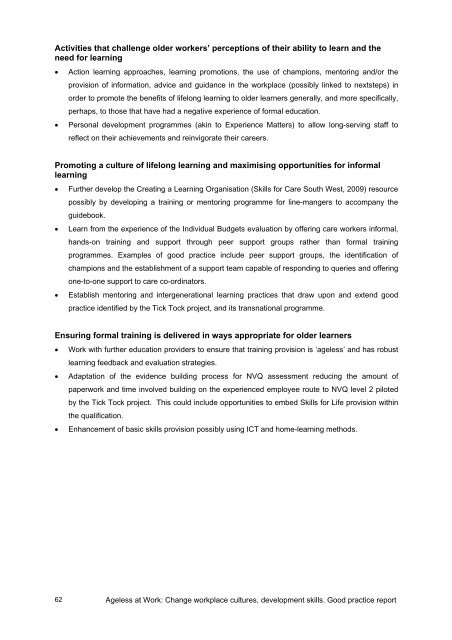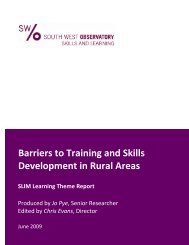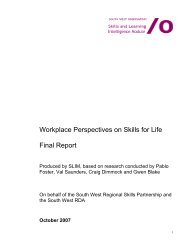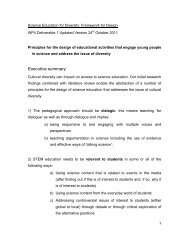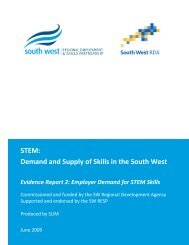Ageless at Work - Skills for Care
Ageless at Work - Skills for Care
Ageless at Work - Skills for Care
You also want an ePaper? Increase the reach of your titles
YUMPU automatically turns print PDFs into web optimized ePapers that Google loves.
Activities th<strong>at</strong> challenge older workers’ perceptions of their ability to learn and the<br />
need <strong>for</strong> learning<br />
<br />
<br />
Action learning approaches, learning promotions, the use of champions, mentoring and/or the<br />
provision of in<strong>for</strong>m<strong>at</strong>ion, advice and guidance in the workplace (possibly linked to nextsteps) in<br />
order to promote the benefits of lifelong learning to older learners generally, and more specifically,<br />
perhaps, to those th<strong>at</strong> have had a neg<strong>at</strong>ive experience of <strong>for</strong>mal educ<strong>at</strong>ion.<br />
Personal development programmes (akin to Experience M<strong>at</strong>ters) to allow long-serving staff to<br />
reflect on their achievements and reinvigor<strong>at</strong>e their careers.<br />
Promoting a culture of lifelong learning and maximising opportunities <strong>for</strong> in<strong>for</strong>mal<br />
learning<br />
<br />
<br />
<br />
Further develop the Cre<strong>at</strong>ing a Learning Organis<strong>at</strong>ion (<strong>Skills</strong> <strong>for</strong> <strong>Care</strong> South West, 2009) resource<br />
possibly by developing a training or mentoring programme <strong>for</strong> line-mangers to accompany the<br />
guidebook.<br />
Learn from the experience of the Individual Budgets evalu<strong>at</strong>ion by offering care workers in<strong>for</strong>mal,<br />
hands-on training and support through peer support groups r<strong>at</strong>her than <strong>for</strong>mal training<br />
programmes. Examples of good practice include peer support groups, the identific<strong>at</strong>ion of<br />
champions and the establishment of a support team capable of responding to queries and offering<br />
one-to-one support to care co-ordin<strong>at</strong>ors.<br />
Establish mentoring and intergener<strong>at</strong>ional learning practices th<strong>at</strong> draw upon and extend good<br />
practice identified by the Tick Tock project, and its transn<strong>at</strong>ional programme.<br />
Ensuring <strong>for</strong>mal training is delivered in ways appropri<strong>at</strong>e <strong>for</strong> older learners<br />
<strong>Work</strong> with further educ<strong>at</strong>ion providers to ensure th<strong>at</strong> training provision is ‘ageless’ and has robust<br />
learning feedback and evalu<strong>at</strong>ion str<strong>at</strong>egies.<br />
Adapt<strong>at</strong>ion of the evidence building process <strong>for</strong> NVQ assessment reducing the amount of<br />
paperwork and time involved building on the experienced employee route to NVQ level 2 piloted<br />
by the Tick Tock project. This could include opportunities to embed <strong>Skills</strong> <strong>for</strong> Life provision within<br />
the qualific<strong>at</strong>ion.<br />
Enhancement of basic skills provision possibly using ICT and home-learning methods.<br />
62<br />
<strong>Ageless</strong> <strong>at</strong> <strong>Work</strong>: Change workplace cultures, development skills. Good practice report


